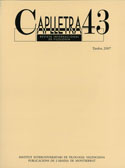Traduccions i usos sintàctics de l'expressió de l'abstracció
DOI:
https://doi.org/10.7203/caplletra.43.4808Keywords:
Translation, Corpus, Abstraction, Stylistics. Abstract
Abstract
The study of translation norms is a key element in traductological studies. Insofar as these norms are linked to cultures and specific historical periods, the analysis of their diverse elements is of fundamental importance. One of the variables that composes these norms is the model of language of the translations, which is devised from the stylistic uses of the translators, mainly from some aspects of language which are particularly controversial. One of them is the syntactic uses for the expression of abstraction, and this paper focuses on their study. The conclusion is that there are
less stylistic resources used and centred in no more than a couple of structures despite the several possibilities existing to express abstraction. Many forms recommended by grammarians appear, at best, with scarce manifestations. The reasons for this lack of
use are varied, probably because of the same translators some times, but also because of the recipients of the translations, who perceive these forms as unusual and, in other cases, as interferences.
 Downloads
Downloads
Downloads
Published
How to Cite
-
Abstract420
-
PDF (Català)84
Issue
Section
License
Authors submitting work to Caplletra for publication must be the legitimate holder of the usage rights. Legitimacy for the purposes of publishing the work must also include images, tables, diagrams and any other materials that may complement the text, whether they are the author of such material or not.
Copyright: on publishing their work in the journal, the author grants Caplletra. Revista Internacional de Filologia usage rights (reproduction, distribution and public communication) for both the paper printed version and for the electronic version.
All work published in Caplletra is covered by the Creative Commons license type Attribution-NonCommercial-NoDerivatives 4.0 (CC BY-NC-ND 4.0).
RESPONSABILITY
Caplletra. Revista Internacional de Filologia does not necessarily identify with the points of view expressed in the papers it publishes.
Caplletra. Revista Internacional de Filologia accepts no responsibility whatsoever for any eventual infringement of intellectual property rights on the part of authors.






